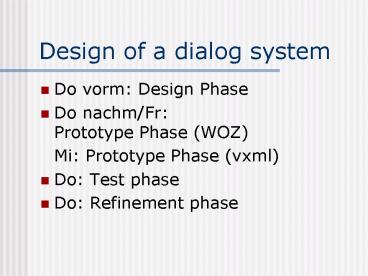Design of a dialog system - PowerPoint PPT Presentation
1 / 14
Title:
Design of a dialog system
Description:
Info ber Spiele: Wann, Wo, Gegner, Schiri. Ergebnisse von Spielen, gelbe/rote Karten, Torj ger ... Limited generation skills (rhythm, intonation) ... – PowerPoint PPT presentation
Number of Views:48
Avg rating:3.0/5.0
Title: Design of a dialog system
1
Design of a dialog system
- Do vorm Design Phase
- Do nachm/Fr Prototype Phase (WOZ)
- Mi Prototype Phase (vxml)
- Do Test phase
- Do Refinement phase
2
Design phase
- Analysing users
- Frequenz breites Spektrum
- oft Spielergebnisse
- seltener Karten, Infos im Vorfeld
- Motivation
- andere Medien nicht verfügbar
- rund um die Uhr
- Erfahrung mit DS wenig
- keine personalisierten Daten
- Weiterleitung möglichst nicht
3
Design phase
- Analysing user tasks
- Info über Eintrittskarten
- Städte und Stadien
- SMS Newsletter abonnieren
- Info über Spiele Wann, Wo, Gegner, Schiri
- Ergebnisse von Spielen, gelbe/rote Karten,
Torjäger - WM-Historie ("Wo war 19xx die WM ? Wer hat
gewonnen ?"), Statistik - Mannschaften
- Anreise-Info
- Interviews
4
Design phase
- High-Level design decisions
- BargeIn -gt No! (however Menus)
- AudioFormating (earcon) -gt Yes! (p.111,171)
- Synthetic Speech vs. Recorded prompts -gt synth.
speech - Simple vs. NLP grammar -gt simple builtin
grammars (p. 115/185) - Style guidlines for wording prompts (p. 116/119
DTMF) - Decide over always active commands (p.121)
- Whether and where to use human operators (p.126)
- Help mode vs. Self-reveiling (dialog state
specific) help -gt Self-reveiling help
5
Design phase
- Low-level design decisions
- Consitent Prompt design
- Max. Menu length (p.141)
- Minimising prompt length
- ... other design guidlines (p.144-152)
- Design Grammar
- Error recovery (p.162)
6
Design phase
- Information flow
- What questions?
- What (typical/unusual/errorness) answers?
- Initial script
- Dialog for expected user-system interaction
- Application interactions
- Localizing inefficient dialog parts -gt
interaction model - Planing for expert users
7
Prototype Phase
- Implement-test-revise Method
- Wizard-of-Oz Method
- suitable for high-cost, high-risk,
high-complexity systems - Only for system behaviour that humans are good in
(e.g. not data-base lookup) - Only if system is still inferiour to humans (e.g.
if no system exist yet) - Only for narrow and clearly defined domains
- Very time-consuming, often difficult to mimic
certain aspects (e.g. restricted grammar)
8
Prototype Phase (WOZ)
- Using a first interaction model
- Human conducts as the system (wizard)
- User believes in testing a real system
- Extensive training of wizard
- Transcription of results
- Interative development of the interaction model
9
Prototype Phase (WOZ)
- Wizard simulates...
- Limited language skills (vocab., semantics,
grammar complexity, non-standard input) - Limited generation skills (rhythm, intonation)
- Misrecognition (if input is out of grammar or
capacity of system) - Limited knowledge
- Wizard support through
- Interaction model
- Filters (e.g. Telephone filter or vocoders)
- System components (ASR, TTS, databases, parts of
future system) - Support tools (pre-recorded sent., ...)
- Assistant
10
Prototype Phase (WOZ)
- Subject selection
- 15 subjects
- Representative for later user group
- Instructing the subjects
- Should believe it is a real system
- Written or oral instruction
- Background info
- Describing a scenario
- systematic design
- Easy to remember (off talk!)
- Open scenario
- Users tend to use words from description
11
Prototype Phase (WOZ)
- Data collection
- Audio
- Transcripts
- Feedback
- Questionaires or Interviews
- Comments
12
Elemente eines SDS
System performance Cooperativity Intitiative Influ
encing user behaviour
Performance
Speech Input Acoustic models Grammar Prosody
Speech Output Recorded Prompts Speech
Synthesis Prosody
Speech
User Utterances Lexicon Grammar Semantics Style
System Utterances Lexicon Grammar Semantics Style
Language
Attentional State Focus Expectations
Intentional Structure Task Communication Types
(domain/meta) Interaction Level
Linguistic Structure Speech acts Reference Discour
se segments
Control
Interaction History Linguistic Task Performance
Domain Model Data Rules
User Model Goals Beliefs Preferences User
group Cognition
Context
13
Interaction model for WOZ
Performance
Speech Input Simple rules to mimic
ASR understand first 10 words dont understand
names ...
Speech Output TTS? System-like style No
stumbling, ...
Speech
User Utterances Restricted, but easy to cope with
System Utterances Uniform sentences Predefined
sentences Terse (non-verbose) style
Language
Attentional State Which info at what state?
Intentional Structure Understand only current
sub-tasks Meta-communication allowed?
Linguistic Structure Restricted, E.g. understand
no questions? References allowed?
Control
Interaction History Wizard assistant keeps a task
record
Domain Model Data must be available and accessable
User Model Hard to know beforehand
Context
14
(No Transcript)































